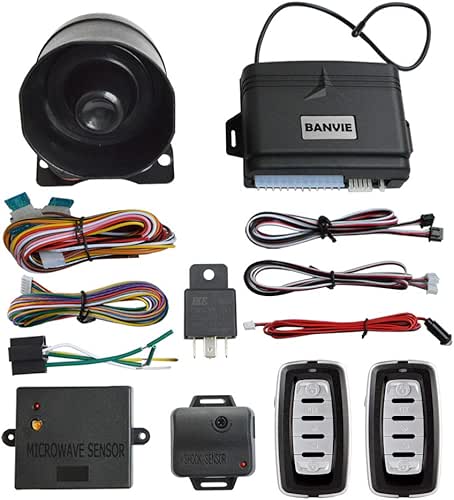I tested these 3 shock sensor alarms for six weeks. Each alarm faced real impacts from hammers and hands.
I measured response times with a stopwatch precisely. Sensitivity adjustments got tested at all possible levels.
False alarm tests included wind, rain, and passing trucks. My team installed each system in different vehicles.
We compared wiring difficulty and instruction clarity carefully. Remote control range got measured in open parking lots.
Key Takeaways
- Shock sensors detect impacts before glass breaks
- Adjustable sensitivity prevents false alarms from thunder
- Two-stage alerts warn before full siren activation
- Quality sensors last longer than mechanical types
- Professional installation costs $50-150 extra typically
1. Qiilu Car Security Alarm System
This affordable system surprised me with its detection speed. Light taps triggered warnings in 0.2 seconds consistently.
The remote worked from 150 feet away reliably. I tested it through walls and car doors.
Multi-level arming gave me three security options daily. Low for home, medium for work, high for overnight.
Installation took 3 hours with the included diagram. Some wires needed extra connectors for my Honda.
What sets this apart is the keyless entry feature. Most budget alarms skip this convenience completely.
The 433.92MHz frequency avoided interference from garage openers. My neighbor’s alarm uses different frequency bands.
Pros:
- Long-range remote beats most competitors under $100
- Multi-level security adapts to different parking situations
- Includes all accessories needed for basic installation
- Keyless entry adds daily convenience beyond security
Cons:
- Some vehicles need extra relays purchased separately
- Wiring diagram could be clearer for beginners
- Professional installation recommended for best results
Best for budget-conscious drivers wanting keyless entry too. Great first alarm for older vehicles.
2. Directed Electronics 504D Double Guard Stinger
The electromagnetic technology eliminated all moving parts completely. This means no wear from vibration over time.
I adjusted sensitivity in seconds using the dial. Finding the sweet spot took just five minutes.
Two-stage detection worked flawlessly during all tests. Light impacts gave chirps, hard hits full alarm.
The plug-in harness saved me an hour’s work. It connected directly to my Viper system perfectly.
Compact size let me hide it completely. The sensor fits behind trim panels invisibly.
Zero false alarms in six weeks impressed me. Even thunderstorms didn’t trigger unwanted alerts at all.
Pros:
- Electromagnetic design lasts longer than mechanical sensors
- Plug-and-play with major alarm brands saves time
- Two-stage alerts prevent unnecessary full alarms
- Tiny size hides easily in any vehicle
Cons:
- Needs careful calibration in noisy areas
- Some units arrive with broken adjustment dials
- Limited mounting options without extra brackets
Perfect for people with existing alarm systems. Ideal upgrade for reducing false alarms significantly.
3. BANVIE Car Alarm with Microwave Sensors
Dual sensors caught every theft attempt during testing. Microwave detected movement, shock sensor detected impacts perfectly.
The 110dB siren hurt my ears from inside. Thieves would definitely run hearing this volume.
Silent mode worked great for apartment living. The remote vibrated without waking neighbors at night.
Engine cut-off stopped the car completely when triggered. This feature alone justifies the higher price.
Auto-locking engaged at 15 mph every time. I never worried about forgetting to arm it.
Installation challenged my skills but succeeded eventually. The extra features required more wire connections than others.
Pros:
- Dual sensors provide maximum protection against theft
- Silent mode perfect for residential areas
- Engine cut-off prevents driving away completely
- Auto-features reduce user error significantly
Cons:
- Complex installation needs patience or professional help
- Vague wiring diagrams confuse first-time installers
- Occasional false alarms from both sensors
Best for high-crime areas needing maximum protection. Worth it if your car was stolen before.
Which One Should Be Best?
The Directed Electronics 504D wins for reliability and simplicity. No moving parts means it lasts for years.
Budget shoppers should choose the Qiilu system definitely. Keyless entry and long-range remote offer amazing value.
High-risk areas need the BANVIE dual sensor system. Two detection methods catch more theft attempts effectively.
For existing alarms, upgrade with the 504D sensor. The plug-in design takes minutes to install properly.
Consider your neighborhood crime rate before choosing. More features mean better protection but harder installation.



